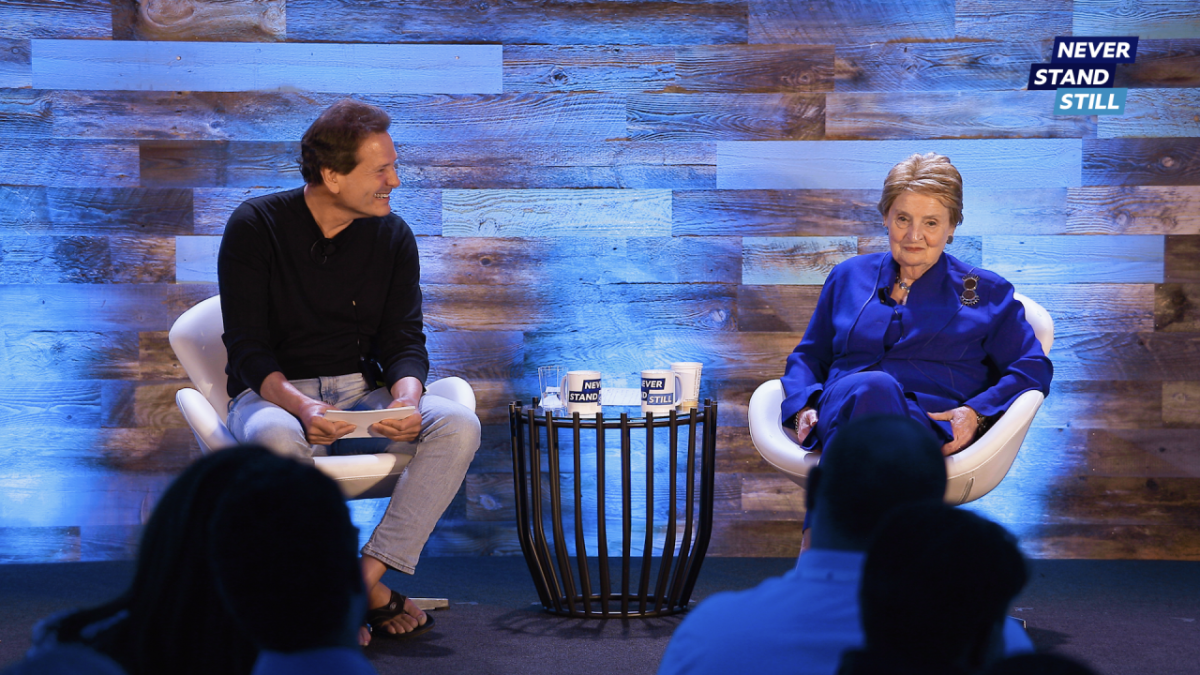Leading With Diplomacy: My Never Stand Still Conversation With Former U.S. Secretary of State Madeleine Albright

Madeleine Albright was the first woman to serve as the U.S. Secretary of State. She was also Ambassador to the United Nations and a recipient of the Presidential Medal of Freedom, the highest civilian honor in the United States. Her accolades and honors are as extensive as her brooch collection, which she uses as a form of personal expression.
As a refugee from Czechoslovakia whose family escaped the Holocaust in the 1930s, Secretary Albright also has a powerful story of resilience. Her passion for international relations and fierce advocacy for democracy and human rights take on even more meaning considering her life story.
Secretary Albright recently spoke to PayPal’s VP+ leadership team for our first live taping of Never Stand Still. I was honored to host her at PayPal and am pleased to pass along some key takeaways from our conversation to you all:
Adapt to your situations quickly.
Secretary Albright has had to learn how to adapt quickly throughout her life. By the time she arrived in the United States at age 11, she had already lived in Czechoslovakia, been exiled to England, and studied in Switzerland. After graduating from Wellesley College, she wanted to be a reporter, but was told she shouldn’t be “competing” with her husband in the same industry, and ended up shifting gears to academia and then government. “I had to adjust to a lot of different situations quickly,” she said. “And so an awful lot of what I grew up with was shifting various places…and learning to be friends very quickly.”
There are many parallels in business. It’s so important that we be agile and innovative on behalf of our customers—whether it’s new products, services, or features we deliver for customers to have more control over their financial lives, or the way we ensure a secure and reliable platform our customers can depend on. Sometimes, these innovations are highly visible, and other times, it’s embedded in the way we work together and collaborate with stakeholders inside and outside of PayPal’s walls. We understand that our customers’ needs are often evolving, and we’re always changing right along with them.
Partnerships are essential to solving the world’s most challenging issues.
Secretary Albright shared that she not only learned from U.S. diplomats in foreign countries, but also from U.S. companies with a local presence in international markets. She found that the companies often had very different perspectives than the diplomats and, by speaking with both, she would get a more accurate picture of the geopolitical situation. Additionally, she found that American businesses were good ambassadors for issues like labor and health policies, and she even created an award for companies that were good corporate citizens.
In our conversation, Secretary Albright highlighted the importance of public-private partnerships for their ability to help solve some of the world’s most intractable problems. “The private sector needs to be at the table at international conferences early—not to come and pick up the pieces once the decision has been made,” she said.
At PayPal, our mission is to strengthen financial health around the world and make it easier for people to participate in the global digital economy. Achieving this mission requires radical engagement across the ecosystem. Partnerships and collaboration are critical to innovation, and we’ve been focused on breaking down silos and building a One Team ethos to best serve our customers—both internally and across the industry. The power of PayPal isn’t in any one individual function, product or region; it’s in what we achieve when we come together. We understand that we’re stronger and can better serve all of our stakeholders when we partner versus going it alone.
Empathy is key to making connections and finding solutions to problems.
As you can imagine, Secretary Albright has met and worked with some of the most powerful people in the world. She learned to balance tough conversations by establishing a rapport and prioritizing empathy. She said, “It’s very important to put yourself into the shoes of the other person, which means that you need to know something about them.” She was able to connect with leaders from North Korea, Serbia, Germany and many more—and those connections helped her navigate some of her toughest challenges.
We encourage the same empathy at PayPal, because we are all better off when we take the time to try to understand someone. For example, our employees participate in Financial Immersion Days to gain perspective on how the financially underserved navigate their daily lives. We assign participants a persona and set of tasks to complete with just a cell phone, an ID, and a $50 check—with no bank account. They consistently walk away with new insights into our customers’ needs that they can infuse into our customer-focused problem solving. Empathy not only helps us create a healthier and more inclusive workforce, but it helps us understand the real needs and challenges of the populations we want to serve and provide solutions that help improve their lives.
It truly was my distinct honor and pleasure to host Secretary Albright at PayPal. I’ve included our full conversation below. (If you watch until the end, you’ll see what brooches Madeleine wore for her visit to our offices.)

